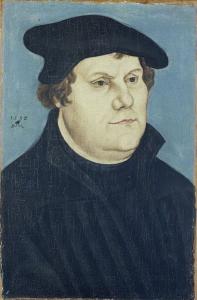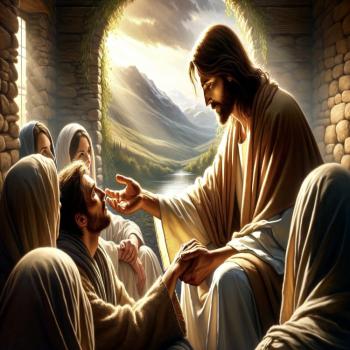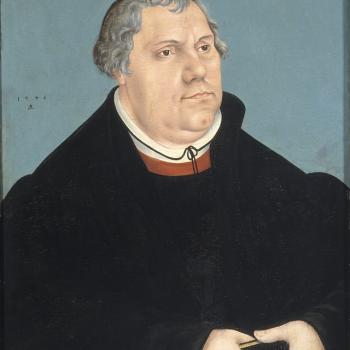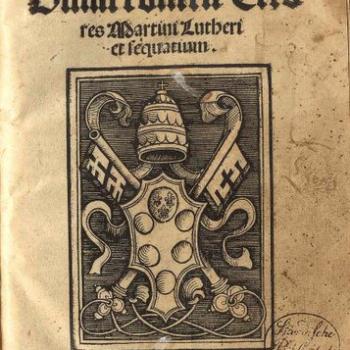
+ Luther’s ignoring of the biblical motif of “You will know them by their fruits” (Matthew 7:16)
The following is drawn from The Interpretation of the Second Psalm (March 1532), derived from the transcription of the “indefatigable scribe” Georg Rörer (1492-1557), possibly also from the notes of Veit Dietrich (1506-1549), who prepared it for publication in 1546 (see the Introduction in Luther’s Works, Vol. 12, viii). Since it is included in a set called Luther’s Works, the editors evidently concluded that it was substantially Luther’s words. His words will be in blue below.
***
Read the writings of the papists, listen to their discourses, and you will find that they rely on this one argument, namely, the claim that nothing good has come of our teaching. For immediately after our Gospel sounded forth, there followed the horrible revolt of the peasants, disagreements and sects arose in the church, discipline broke down, and, as if all the restraints of the laws were done away with, all began to indulge in the greatest license. This is indeed true. For now there is greater freedom for all vices than there was in former times, when the common crowd was coerced with fear. But now, like an unbridled horse, it undertakes everything according to its own good pleasure. For it despises the ecclesiastical chains with which it was formerly held by the papacy and makes full use of the negligence of the civil magistrate. All these misfortunes, which are by no means trifling, our adversaries impute to our teaching or to the Gospel. (Luther’s Works, Vol. 12, 7-8; specifically commenting on Psalms 2:2)
Thus far, Luther recounts what he assumes are the self-evident facts of Lutheran behavior in practice, as opposed to the teaching he introduced. He lamented these things many times (and I’ve documented many similar utterances: see “Related Reading” near the end). But Luther had a ready explanation for why they happened:
But suspend judgment a little while, and first reflect more carefully. Reduce the argument to a dialectical form, and consider whether this is a logical conclusion: “This theologian is evil, therefore theology is evil; this lawyer is worthless, therefore a knowledge of the law is also bad; this teacher is a fornicator, therefore the arts which he teaches are a fornication.” Would we not call anyone mad who defended these conclusions as good and sound? Nevertheless the adversaries draw inferences not a bit wiser than this. But listen to this psalm foretelling that when this King begins His kingdom, that is, when He begins to teach, the murmurings of the heathen will follow, the conspiring of the peoples, battles and the wars of kings, the plottings and counsels of the rulers. Against whom? Against the Lord and His Christ. Therefore fortify your conscience and, admonished by the Holy Spirit in this passage, understand that the world will be in an uproar. But do not put the blame on this King or His Word, but rather on Satan and the godless world. You must, on the contrary, affirm and declare: “Though evils follow the teaching of this King, nevertheless the teaching is not on that account evil, but rather the men are evil who are opposed to the good teaching and wish it suppressed.” For it is a true and logical conclusion that the more eagerly the world opposes this sacred teaching, the more evil and wicked it is. Nor should the teaching be maligned on account of the fault of men. The Jews crucify Christ, shall we therefore accuse Christ, the Teacher? It is therefore necessary for us to be well fortified in advance and to say: “What is that to God, what is that to His Word, if men are evil? For this is the imperfection of men, not of God, who for this very reason sends His Son and His Word that men may be saved. But if they are not willing, they perish by their own fault. Christ does not for this reason cease to be the Son of God, God does not for this cause reject Him whom He has appointed king over all things. (Ibid., 8-9; my bolding)
In his sermon for the Twenty Sixth Sunday After Trinity, on Matthew 25:31-46 (1522?), from The Precious and Sacred Writings of Martin Luther (John Nicholas Lenker, Minneapolis, Lutherans in All Lands Co., Vol. XIV, 1905, 379- 395; currently updated in Vols. 75-78 of Luther’s Works), Luther sounded the same theme (all bolding my own):
11. It seems as though he meant hereby to show that many Christians, after receiving the preaching of the Gospel, of the forgiveness of sins and grace through Christ, become even worse than the heathen. For he also says in Mat. 19, 30, “Many that are first shall be last; and the last shall be first.” Thus it will also be at the end of the world; those who should be honest Christians, because they heard the Gospel, are much worse and more unmerciful than they were before, as we see too many examples of this even now.
Aforetime when we were to do good works under the seduction and false worship of the Papacy, every one was ready and willing; a prince, for example, or a city, could give more alms and a greater endowment than now all the kings and emperors are able to give. But now all the world seems to be learning nothing else than how to estimate values, to rake and scrape, to rob and steal by lying, deceiving, usury, overcharging, overrating, and the like; and every man treats his neighbor, not as though he were his friend, much less as his brother in Christ, but as his mortal enemy, and as though he intended to snatch all things to himself and begrudge everything to others.
12. This goes on daily, is constantly increasing, is a very common practice and custom, among all classes of people, among princes, the nobility, burghers, peasants, in all courts, cities, villages, yes in almost every home. Tell me, what city is now so strong and pious as to be able to raise an amount sufficient to support a schoolmaster or a preacher? (pp. 384-385)
15. We ought really to be ashamed of ourselves, having had the example of parents, ancestors, lords and kings, princes and others, who gave so liberally and charitably, even in profusion, to churches, ministers, schools, endowments, hospitals and the like; and by such liberal giving neither they nor their descendants were made poorer. What would they have done, had they had the light of the Gospel, that is given unto us? (p. 386)
34. . . . the same conditions, alas, prevail now everywhere ; and I fear and must almost resign myself that Germany may have the same experience as Sodom and Jerusalem, and will be a thing of the past; it will either be destroyed by the Turks or it will crumble by its own hand, unless the last day overtake it soon. For the present conditions are altogether unbearable and so exceedingly bad that they cannot become worse; and if there be still a God, he cannot thus let matters go on unpunished. (p. 394)
In another similar sermon on Matthew 18:21-25 (Twenty Second Sunday After Trinity, 1530), available via a multi-volume Baker Books edition (1996) edited by Eugene F. A. Klug and also in The Complete Sermons of Martin Luther (Grand Rapids: Baker Books, 2000), Luther stated:
28. The nature of the gospel is such, that those who misuse it, become more wicked than they were before. Christ himself says (Matt. 12:43-45): “When the unclean spirit is gone out of a man, he walketh through dry places, seeking rest, and findeth none. Then he saith, I will return into my house from whence I came out; and when he is come, he findeth it empty, swept, and garnished. Then goeth he, and taketh with himself seven other spirits more wicked than himself, and they enter in and dwell there: and the last state of that man is worse than the first. Even so shall it be also unto this wicked generation.” There you have it, black on white! Any person to whom the gospel is proclaimed and who then misuses that gospel, becomes seven times more wicked than he was to begin with, and it would have been better for him if he had never heard the gospel. That is why I have often said that if I could accomplish things by wishing, I would wish that peasants, burghers, and nobles, who now horribly misuse the gospel, might still be under the papacy, for they are nothing but a hindrance, a shame and a disgrace to the gospel.
29. You see that illustrated here in this wicked servant too. After having experienced such great mercy, this scoundrel leaves and becomes more wicked than he had been before. This is not just my own personal judgment or opinion; it is the judgment of our Lord Christ himself, In crystal clear words he asserts that those who become evangelicals turn out to be more wicked than they were before. Experience, too, teaches us that this is so. Sad to say, we daily experience the fact that people who are under the gospel now bear greater and more bitter hatred and envy in their hearts; they are more greedy and to materialistic now than when they were still under the papacy. As Christ says, The reason for this is that they have again opened their heart’s door to Satan, and he has brought with himself seven other spirits more wicked than he himself is. We, who proclaim the gospel, must simply put up with the fact that under the gospel people become more wicked than they were before. But it is not the fault of the gospel, but of the devil and those people who return to serving Satan, allowing him to reenter their hearts and rule there along with sew other, more wicked spirits. This really depresses and angers the rest of the servants, so they come and report to the king the sordid conduct of their fellow servant. We, too, experience the same kind of disappointment when those who have the reputation of being “evangelical” conduct themselves so disgracefully and abominably that we really wish they were still under the papacy. But here we follow the example of these fellow servants by bringing their disgraceful abuse of the gospel to the attention of God and of the public. (The Complete Sermons, vol. 7, 141-142; my bolding)
In another sermon in 1537, he bitterly observed:
[W]ho of us would have begun to preach if we had known in advance that so much misery, sectarianism, offense, blasphemy, ingratitude, and malice would ensue? (Luther’s Works, Vol. 24, 358)
Another line of reasoning that is relevant is to note that Luther thought his period was the last days, with the Second Coming imminent. And so he wrote in the same year:
I have no doubt that the Last Day is not far away, though the highly intelligent and super-rational world is not concerned about this, being are that there is no need for that for a long time. As time goes on it is becoming so callous and wicked that, even if no Last Day were supposed to come, still it itself—highly intelligent reason—would have to say that it may not and cannot continue or remain this way for long . . .
It is an old saying, repeated by many teachers, that after the revelation of the Antichrist the people will become so dissolute that they will thereafter be unwilling to know or to believe anything about any god. Rather, each one will do or not do according to his own pleasure, as the devil and the flesh teach. We see such a time being fulfilled here before our eyes. For now that the horrible, dreadful lies and deception of the abominable Antichrist, the papacy, have been revealed and come to the light of day through God’s amazing and exceptional grace, the people are beginning to believe nothing at all any longer. And because they feel freed and released from the bonds and strictures of the papacy, they want to be released and freed from the Gospel and all of God’s commandments as well. From now on whatever pleases them and seems good is to be good and right By rights, this will be the end of the song, if God so wills. (Preface to Ambrosius Moibanus, The Glorious Commission of Jesus Christ, Our Lord and Savior (Mark 16 [:15]), in Luther’s Works, Vol. 60, 149-150; my bolding)
So what happens if his period is not the last days? Another 500 years have gone by. We can safely say — with the considerable benefit of hindsight — that they weren’t. Therefore, this explanation must be discarded. If it’s not the last days and the devil, what was the cause of all the upheavals and chaos in Lutheran circles? Again, in a letter to his wife, Katie, dated 28 July 1545, a little less than six months before he died, Luther disdainfully lamented the moral conditions in his Wittenberg (he did return later, however):
I would like to arrange matters in such a way that I do not have to return to Wittenberg. My heart has become cold, so that I do not like to be there any longer. . . . As things are run in Wittenberg, perhaps the people there will acquire not only the dance of St. Vitus or St. John, but the dance of the beggars or the dance of Beelzebub, since they have started to bare women and maidens in front and back, and there is no one who punishes or objects. In addition the Word of God is being mocked [there]. Away from this Sodom! . . . I am tired of this city and do not wish to return . . .
I. . . will rather eat the bread of a beggar than torture and upset my poor old [age] and final days with the filth at Wittenberg . . . I am unable any longer to endure my anger [about] and dislike [of this city]. (Luther’s Works, Vol. 50, 278-281; my bolding)
Luther tried very hard to reasonably comprehend and explain (from Scripture) what immensely troubled him, and to counter the Catholic accusations; and indeed he made some perfectly valid points: particularly his argument that sinning practitioners don’t prove the falsity of the teaching they are claiming to be following. I’ve utilized the same argument many times in defending Catholicism, under the general category of “sinners in the Church.” But that only goes so far. I don’t think Luther can fully explain what happened in early Lutheranism and larger Protestantism on this basis alone. Nor can he — like the comedian Flip Wilson’s famous routine — rely on “the devil made me do it” excuse: his other primary interpretation of the scandalous events in Protestant circles.
He remains responsible for introducing — or greatly popularizing — the notions of private judgment, sola Scriptura, and supremacy of the individual conscience (too disconnected from traditional precedent). These things, in my opinion, had a direct causal relationship with the rampant sectarianism that immediately commenced, and that he despised (as I recently argued). Luther, of course, detested lawless antinomianism, too, and counseled the necessity of good works.
Nevertheless, I would contend that it was inevitable that his “faith alone” doctrine would be distorted and transformed by less educated, unsophisticated, brand-new Lutherans into reckless sinning under the assumption that it was permitted, since good works were formally separated from salvation altogether (imputed justification) in Luther’s and Lutheranism’s soteriology. I would say that a false doctrine leads to bad fruit in practice, because the initial untruth will be distorted even further, including sanction for sin.
As I have suggested many times, the problem wasn’t Luther’s deliberate intention to do evil (I think he was perfectly sincere and well-intended, albeit too often wrong) but rather, his naivete about human nature and his initial assumption about the likelihood that all would be well and good and so much better than the former Catholic “norm” in his new Lutheran movement. When it clearly wasn’t, especially after 1525 and the Peasants’ Revolt, Luther (rather than examine whatever may have been his role in bringing these events about) started to develop the above sort of explanation (I dare say, rationalization) for the unfortunate turn of events in his circles.
Sectarianism remains perhaps the biggest “Achilles Heel” and unresolvable difficulty in Protestantism to this day. But the breaking down of “discipline” in Luther’s Wittenberg and surrounding areas is directly attributable to Luther’s rejection of Catholic authority and hierarchy, leading to a scenario where — as he describes — “all the restraints of the laws were done away with” because the “ecclesiastical chains . . . formerly held by the papacy” were no longer present. Part of this aspect: “the negligence of the civil magistrate” was a result of Lutheranism’s replacement of the Catholic bishops (whom they no longer recognized as authoritative) with the secular German princes: a thing that his best friend and successor Philip Melanchthon bitterly regretted, to the point of frequent tears and despair. Melanchthon wrote to his friend, Joachim Camerarius, in a letter dated 31 August 1530:
Oh, would that I could . . . restore the administration of the bishops. For I see what manner of church we shall have when the ecclesiastical body has been disorganized. I see that afterwards there will arise a much more intolerable tyranny [of the princes] than there ever was before. (in Book of Concord, “Historical Introductions to the Lutheran Confessions,” by F. Bente: VII. Smalcald Articles and Tract concerning Power and Primacy of the Pope: section 70)
Protestant Church historian Philip Schaff mentioned this belief of Melanchthon’s, on page 33 of his History of the Christian Church, Vol. VII (Chapter One; § 10): “The many and crying abuses which followed this change in the hands of selfish and rapacious princes, were deeply deplored by Melanchthon.” Ignoring all this, and any hint of any causation or personal responsibility as a result of his own innovations, Luther preached:
That the kings and rulers rage against us at the present time, that Zwingli, Carlstadt, and others cause disturbances in the church, that burghers and peasants condemn the Gospel, is therefore nothing new or unusual. (Ibid., 10)
These people, then [“kings” and “rulers”], are the causes of the tumults and scandals, not we who are moderate, peaceful, quiet. And the kind of teaching we offer is also not turbulent, but most peaceful. . . . Our adversaries . . . stir up the princes of the world against us. (pp. 11-12)
***
“Please Hit ‘Subscribe’”! If you have received benefit from this or any of my other 4,600+ articles, please follow this blog by signing up (with your email address) on the sidebar to the right (you may have to scroll down a bit), above where there is an icon bar, “Sign Me Up!”: to receive notice when I post a new blog article. This is the equivalent of subscribing to a YouTube channel. Please also consider following me on Twitter / X and purchasing one or more of my 55 books. All of this helps me get more exposure, and (however little!) more income for my full-time apologetics work. Thanks so much and happy reading!
***
Another thing that Luther seems to have neglected altogether in this regard (certainly in this sermon) is the biblical motif of “the good tree is known by its fruits.” Is this a completely irrelevant consideration, when it comes to examining whatever the “fruit” of Lutheranism and larger Protestantism was and is? Let’s see what the Bible (and especially our Lord Jesus) say about it:
Psalm 105:24 (RSV)And the LORD made his people very fruitful, and made them stronger than their foes.
Proverbs 11:30 The fruit of the righteous is a tree of life, but lawlessness takes away lives.
Proverbs 14:14 A perverse man will be filled with the fruit of his ways, and a good man with the fruit of his deeds.
Isaiah 3:10 Tell the righteous that it shall be well with them, for they shall eat the fruit of their deeds.
Isaiah 32:16 Then justice will dwell in the wilderness, and righteousness abide in the fruitful field.
Jeremiah 12:2 Thou plantest them, and they take root; they grow and bring forth fruit; . . .
Jeremiah 17:8, 10 He is like a tree planted by water, that sends out its roots by the stream, and does not fear when heat comes, for its leaves remain green, and is not anxious in the year of drought, for it does not cease to bear fruit. . . . [10] I the LORD search the mind and try the heart, to give to every man according to his ways, according to the fruit of his doings. (cf. 21:14; 32:19)
Zechariah 8:12 For there shall be a sowing of peace; the vine shall yield its fruit, and the ground shall give its increase, and the heavens shall give their dew; and I will cause the remnant of this people to possess all these things.
Matthew 3:10 Even now the axe is laid to the root of the trees; every tree therefore that does not bear good fruit is cut down and thrown into the fire.
Matthew 7:16-21 You will know them by their fruits. Are grapes gathered from thorns, or figs from thistles? [17] So, every sound tree bears good fruit, but the bad tree bears evil fruit. [18] A sound tree cannot bear evil fruit, nor can a bad tree bear good fruit. [19] Every tree that does not bear good fruit is cut down and thrown into the fire. [20] Thus you will know them by their fruits. [21] “Not every one who says to me, ‘Lord, Lord,’ shall enter the kingdom of heaven, but he who does the will of my Father who is in heaven. (cf. Lk 6:43-44)
Matthew 12:33, 35 Either make the tree good, and its fruit good; or make the tree bad, and its fruit bad; for the tree is known by its fruit. . . .
[35] The good man out of his good treasure brings forth good, and the evil man out of his evil treasure brings forth evil.Matthew 21:43 Therefore I tell you, the kingdom of God will be taken away from you and given to a nation producing the fruits of it.”
Luke 8:15 And as for that in the good soil, they are those who, hearing the word, hold it fast in an honest and good heart, and bring forth fruit with patience.
John 15:2, 4-5 Every branch of mine that bears no fruit, he takes away, and every branch that does bear fruit he prunes, that it may bear more fruit. . . . [4] Abide in me, and I in you. As the branch cannot bear fruit by itself, unless it abides in the vine, neither can you, unless you abide in me. [5] I am the vine, you are the branches. He who abides in me, and I in him, he it is that bears much fruit, for apart from me you can do nothing.
John 15:16 . . . I chose you and appointed you that you should go and bear fruit and that your fruit should abide . . .
Romans 7:4 . . . so that you may belong to another, to him who has been raised from the dead in order that we may bear fruit for God.
Galatians 5:22 But the fruit of the Spirit is love, joy, peace, patience, kindness, goodness, faithfulness,
Philippians 1:11 filled with the fruits of righteousness which come through Jesus Christ, to the glory and praise of God.
Colossians 1:6, 10 which has come to you, as indeed in the whole world it is bearing fruit and growing — so among yourselves, from the day you heard and understood the grace of God in truth, . . . [10] to lead a life worthy of the Lord, fully pleasing to him, bearing fruit in every good work and increasing in the knowledge of God.
Hebrews 12:11 For the moment all discipline seems painful rather than pleasant; later it yields the peaceful fruit of righteousness to those who have been trained by it.
James 3:17 But the wisdom from above is first pure, then peaceable, gentle, open to reason, full of mercy and good fruits, without uncertainty or insincerity.
If the original Lutheran movement was not exhibiting this fruit much at all (according to Luther’s own frequent reports and lamentations), then Catholics were altogether justified, on this biblical basis, to question — at least to some degree — the movement itself and its false tenets. When St. Paul rebuked the notoriously sinful Corinthians and Galatians, he didn’t simply say that the devil would oppose any good movement from God and the gospel, etc. He commanded them to rise above all that, with God’s grace and power:
1 Corinthians 5:1-2, 7, 13 It is actually reported that there is immorality among you, and of a kind that is not found even among pagans; for a man is living with his father’s wife. [2] And you are arrogant! Ought you not rather to mourn? Let him who has done this be removed from among you. . . . [7] Cleanse out the old leaven that you may be a new lump, as you really are unleavened. . . . [13] . . . “Drive out the wicked person from among you.”
1 Corinthians 6:9-11, 18-20 Do you not know that the unrighteous will not inherit the kingdom of God? Do not be deceived; neither the immoral, nor idolaters, nor adulterers, nor sexual perverts, [10] nor thieves, nor the greedy, nor drunkards, nor revilers, nor robbers will inherit the kingdom of God. [11] And such were some of you. But you were washed, you were sanctified, you were justified in the name of the Lord Jesus Christ and in the Spirit of our God. . . . [18] Shun immorality. Every other sin which a man commits is outside the body; but the immoral man sins against his own body. [19] Do you not know that your body is a temple of the Holy Spirit within you, which you have from God? You are not your own; [20] you were bought with a price. So glorify God in your body.
Galatians 5:1 For freedom Christ has set us free; stand fast therefore, and do not submit again to a yoke of slavery.
Jesus acted in the same way with the seven churches of Revelation:
Revelation 2:4-5 But I have this against you, that you have abandoned the love you had at first. [5] Remember then from what you have fallen, repent and do the works you did at first. If not, I will come to you and remove your lampstand from its place, unless you repent.
Revelation 2:14-16 But I have a few things against you: you have some there who hold the teaching of Balaam, who taught Balak to put a stumbling block before the sons of Israel, that they might eat food sacrificed to idols and practice immorality. [15] So you also have some who hold the teaching of the Nicola’itans. [16] Repent then. If not, I will come to you soon and war against them with the sword of my mouth.
Revelation 3:2-3 Awake, and strengthen what remains and is on the point of death, for I have not found your works perfect in the sight of my God. [3] Remember then what you received and heard; keep that, and repent. If you will not awake, I will come like a thief, and you will not know at what hour I will come upon you.
Revelation 3:15-16 I know your works: you are neither cold nor hot. Would that you were cold or hot! [16] So, because you are lukewarm, and neither cold nor hot, I will spew you out of my mouth.
It wasn’t sufficient for Luther to simply appeal to the “sin argument” and the Flip Wilson “the devil made me do it” argument, in reply to Catholic criticisms. That works to an extent, but not as a complete answer. It’s just not feasible. It seems to come down in Luther’s case to the usual human failing of not being able to admit one’s own failures, whereas outside observers readily can see them. His flock had blind spots and tragically mistaken notions, and they weren’t following what Luther taught them, but he also had blind spots.
It’s not simply “anti-Protestant” or “anti-Luther[anism]” Catholic bias to point this out. Something really was seriously wrong in early Protestantism (again, as observed by Luther himself, over and over), and a serious, humble, dispassionate examination and analysis is called for, as opposed to the usual boorish and tendentious historical revisionism, hagiography, rationalizations, tunnel vision, or twisted, exaggerated caricatures that both sides too often fall into.
Matthew 7:5 . . . first take the log out of your own eye, and then you will see clearly to take the speck out of your brother’s eye.
Mark 8:18 Having eyes do you not see, and having ears do you not hear? . . . (cf. Mt 11:15; 13:15; Jn 9:41)
Martin Luther: “Our manner of life is as evil as is that of the papists” [12-29-07]
Luther on Early Lutherans: “Ingrates” Who Deserve God’s “Wrath” [2-28-10]
Luther on Early Lutheran Degeneracy & Bad Witness [3-2-10]
Luther: Monks & Priests More “Earnest” Than Lutherans [11-10-11]
*
Practical Matters: Perhaps some of my 4,600+ free online articles (the most comprehensive “one-stop” Catholic apologetics site) or fifty-five books have helped you (by God’s grace) to decide to become Catholic or to return to the Church, or better understand some doctrines and why we believe them.
Or you may believe my work is worthy to support for the purpose of apologetics and evangelism in general. If so, please seriously consider a much-needed financial contribution. I’m always in need of more funds: especially monthly support. “The laborer is worthy of his wages” (1 Tim 5:18, NKJV). 1 December 2021 was my 20th anniversary as a full-time Catholic apologist, and February 2022 marked the 25th anniversary of my blog.
PayPal donations are the easiest: just send to my email address: apologistdave@gmail.com. Here’s also a second page to get to PayPal. You’ll see the term “Catholic Used Book Service”, which is my old side-business. To learn about the different methods of contributing (including Zelle), see my page: About Catholic Apologist Dave Armstrong / Donation Information. Thanks a million from the bottom of my heart!
*
***
*
Photo Credit: Portrait of Martin Luther (1532), by Lucas Cranach the Elder (1472-1553). [public domain / Wikimedia Commons]
Summary: Martin Luther, in a sermon in 1532, rebuked the extreme sinfulness of his flock, but then emphasized that this was the devil trying to mess up his “new” gospel. This won’t do . . .
















